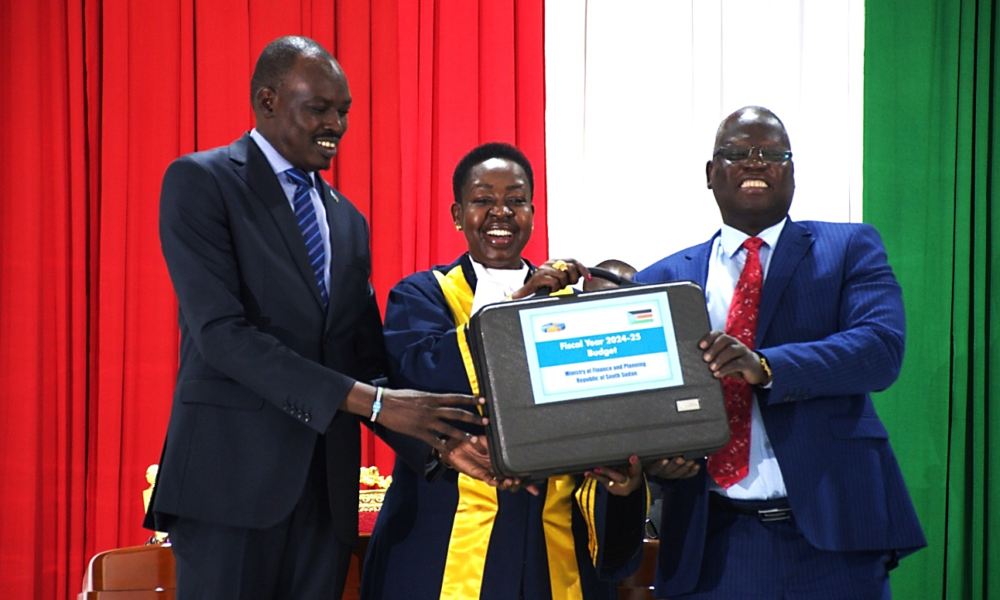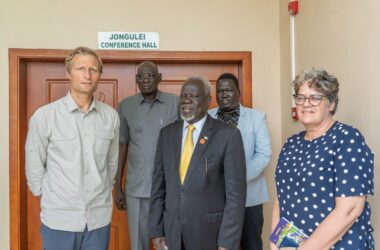By William Madouk
Minister of Finance and Planning, Marial Dongrin Ater, PhD, on Wednesday, presented the Draft National Budget for the Fiscal Year 2024-2025 to parliament, three months after the end of the 2023-2024 budget. The proposed budget outlines a total expenditure of SSP 4.172 trillion.
This year’s budget focuses on sustaining peace, ensuring political stability, achieving macroeconomic recovery, and improving the well-being of citizens through strategic resource allocation.
During the presentation, Minister Dongrin highlighted that the proposed budget includes a resource envelope of SSP 2.258 trillion, with SSP 1.138 trillion expected from oil revenues.
Additionally, non-oil revenue is projected to contribute SSP 1.119 trillion, accounting for 50% of the total revenue estimates.
He cited that, to reduce budget deficit production of Dar blend must resume to recover 70 per cent of projected oil revenue amounting to SSP 1.7 trillion
He also indicated that achieving the targeted 50% of non-oil revenue will require the government to implement tax increases in certain categories and eliminate unnecessary tax exemptions.
“We propose adjustment in the fees structure for some tax categories as well as cancellation of non-statutory tax exemption,” he told MPs.
Breaking down the budget’s expenditure ceiling, the minister mentioned that wages and salaries received the largest portion, amounting to SSP 773.8 billion, which makes up about 19 per cent of the budget.
“10% of the total amount, equivalent to SSP 412.5 billion is earmarked for the use of Goods and Services,” he added.
SSP 419.3 billion, constituting 10 per cent was allocated for states, administrative areas and state-organized forces.
While SSP 2.3 billion, approximately 1 per cent of the budget is allocated for other expenses which were not specified.
Meanwhile, 15 per cent, that is around SSP 642.3 billion was allocated for salary arrears for both civil servants and organized forces for the previous year.
“6% of the total amount, aggregating to SSP 257.5 billion is allocated to funding Dec 2026 pre-election activities,” Dongrin stated.
“4.2% of the total amount, summing to SSP 173.7 billion is earmarked for humanitarian and emergency funds,” he noted.
The government in the draft budget, allocated 2.6 per cent, almost SSP 108.5 billion to funding transfer to international treaties. Constituency development got SSP 30 billion, just 1%.
The finance docket put aside SSP 96 billion, approximately 2.3 per cent, for foreign mission arrears.
In addition, for peace implementation, SSP 93.8 billion (2.2%) has been allocated and the Agriculture Bank of South Sudan has been allocated SSP 8.6 billion which is 0.9 per cent of the budget.
“0.9% of the total amount, equivalent to SSP 35.7 billion is earmarked for clearance of carried forward arrears (cheques),” Dongrin added. “While 0.8%, equivalent to SSP 34.3 billion is allocated to funding litigation and settlement of disputes.”
Eleven per cent, that is SSP 493.4 billion was allocated for capital expenditure, and mandatory expenditure such as paying Sudan tariffs while transportation and processing of oil got SSP 157 billion, 3.8%.
SSP 22.8 billion (0.5%) was allocated for funding transfer of 2 per cent to oil-producing states. SSP 34.2 billion was allocated for a funding transfer of 3 per cent to oil-producing communities.
The Minister revealed that the Ministry of Petroleum was allocated SSP 34.2 billion (0.8%). For debt repayment, SSP 286.6 billion, equal to 6.9 per cent was earmarked to clear obligations.
“1.3% of the total amount, equivalent to SSP 55 billion is earmarked for SSRA retention and commission (14.5%,” he said.
“I present the proposed national FY2024/25 budget, appropriation and finance bill for your deliberation and approval,” Dongrin concluded.
While the draft budget has been presented to parliament, it remains to be seen how lawmakers will adjust this allocation.
In response, speaker Jemma Nunu referred the draft national budget to committees led by the specialized committee on economy and planning for scrutiny.
Nunu called on the committees to work hard and report back to the House after 21 days without fail.
However, some lawmakers protested the presentation, arguing that the finance minister had not provided an appropriation report for the previous budget.



